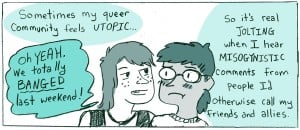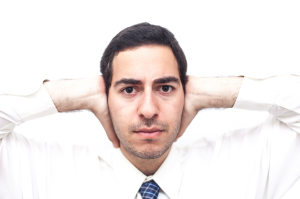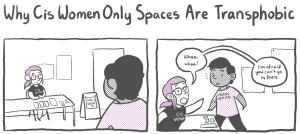
A person sitting on the subway has their legs spread wide, taking up more space than necessary. “02.WMATA.SilverLine.WDC.5January2015” by Elvert Barnes is licensed under CC BY-SA 2.0
A few weeks ago, I was having a meeting with a friend at a coffee shop. It was hot out, I was slouching a bit, and without my really noticing, my legs were sticking out into the aisle. A woman who came by had to walk around them to get inside.
My friend laughed. “Dude, are you manspreading right now?”
“Am I? Maybe. I don’t think so. Maybe…”
I totally was.
In truth, at first I was defensive and had assumed that I wasn’t mainly because I’m not “that guy” – you know, the super entitled jerk who takes up more space than he deserves.
But that’s the thing about manspreading. It’s not about men actively choosing to be jerks or trying to be sexist and ableist (since the outcome of our manspreading not only takes up space under the guise of our needing more room, but also often makes space less accessible for some people with disabilities).
It’s entirely about our socialization – about how we’ve been taught (in subtle and overt ways) never to consider how entitled to public space we may act or feel.
So when countless women point out (often in hilarious ways) that we’re manspreading all over the place, we quickly hear the refrains of “Women do it, too!” and “Stop conflating someone being rude with sexism and toxic masculinity.”
But the problem actually is toxic masculinity and, by extension, sexism – it’s just not as obvious as sexist name-calling or men being physically abusive.
After all, it’s our masculine socialization that ingrains in us from the youngest of ages the idea that we are entitled to what’s around us.
And this is intensified when we add in other forms of social power (or a lack thereof) to the equation.
When male entitlement compounds with class privilege, White privilege, and other forms of privilege, we see the amplification of this privilege and entitlement (all too perfectly exemplified in Donald Trump’s “I’m rich, so I can do what I want” braggadocio).
On the other hand, when White supremacist systems endlessly brutalize and humiliate men of Color while reducing them in the media to strict portrayals of hypermasculinity, then masculinity, the only sense of social power that some men of Color may feel, can show up in hypermasculine expressions or in a sense of entitlement to public space.
We as men have been so inundated with the idea that all space is our space that we, often subconsciously, act as if that’s true – both in our body language and in more overt expressions of entitlement like dominating conversations, talking over other people, and harassing women on the street.
A hilariously perfect illustration of male entitlement to public space, the KoolAid man busts through a wall of a party, shouting “not all men.”
Thus, I do think manspreading is a problem– not because it’s the ultimate example of misogyny, but because it’s a perfect, public representations of the much more concerning issue of sexist male entitlement.
So when we as men experience a lifetime of messages that tie up our identity with entitlement to space and bodies, it makes perfect sense that we would take up more than our fair space on a crowded bus – but we must also understand that this is indicative of something so much bigger.
The point is that, in and of itself, manspreading in public isn’t inherently sexist.
But when it’s taken in the context of power and oppression and all of the other ways that we consciously and subconsciously assert our entitlement into public space, it’s suddenly something entirely sexist.
With that in mind, here are six spaces in which our entitlement shows up in forms other than manspreading, offered with the hope that we as men will reflect a bit on how we can work toward better ways of being in community.
1. Men Dominate Physical Space
Though I’m not into the whole Crossfit thing, one of the things I have heard many women say is that Crossfit is pretty inclusive and that they’re much less likely to experience the “gym dudebro” entitlement at a Crossfit gym.
I can’t tell you how many committed female and gender non-conforming gym goers I’ve talked to about how hard it is to be in gyms with men who either constantly hit on and harass them or leave little room for them with their grunting, screaming, and throwing weights.
And like manspreading, this might just be a case of individuals being rude if it weren’t for all the ways that we as men show entitlement to physical space.
In my own case, it’s shown up with my friends on the dance floor. We love to dance, and we love to really get into it. When there’s a crowded dance floor, that’s not my scene. I want one where we can really move. But when that makes it hard for others to enjoy their time on the dance floor (as we’ve been accused of in the past), our reaction needs to be less “They’re just fun killers” and more “How can we have this awesome time while respecting other people’s space?”
From hyper-competitively running over women in mixed gender sports to dudes taking up entire tables in crowded libraries or coffee shops, we could do better to thinking critically about the physical space we’re occupying – and call on other men to do the same.
2. Men Act Entitled to Intellectual Space
Whether we’re mansplaining something that people who don’t share our gender clearly can understand for themselves or actively contributing to intersectional gender oppression in the academy, men are really good at dominating intellectual space.
This is something I know I’m really good at, and it’s something I need to work on.
I show entitlement to intellectual space by talking down to others in online debates or in coffee shop discussions. But it’s uniquely problematic when I’m doing this, as I have been known to do, to women about women’s issues.
And much like admitting that I, too, am guilty of manspreading, admitting this doesn’t mean that I’m a terrible human being, but it does mean that if I really want to be in solidarity, I need to work on it and do better.
3. Men Dominate and Control Professional Spaces
We don’t need a Harvard study to tell us that the business world is filled with male dominance and entitlement. All we have to do is listen to any woman works in these environments.
Yet, much like manspreading, we have dudes constantly denying even the possibility that it might be sexism and masculinity that’s the problem.
Simply telling women to “lean in” demands nothing of us as men. It frees us from listening and reflecting, rather than dominating and acting entitled in professional environments.
It frees us from working to change male-dominated fields (from kitchens to board rooms) and from following the leadership of women who are demonstrating different ways of leading in the workplace.
If we would claim that our values support women’s leadership, we need to call upon our workplaces to reflect less male entitlement and control.
4. Men Regularly Show Entitlement to Social Spaces
I’ll be the first to admit it. I’ve been that guy on countless occasions, the one making a scene and shouting over other people to be the “hilarious” center of attention at a party. And I’ve been the one who takes off his pants or otherwise acts a fool.
But our entitlement to social space, an entitlement that often gets rewarded by people of all genders, doesn’t have to be as obvious as the center of attention at a party.
Many men’s voices tend to be on the louder side, but that doesn’t mean that we are incapable of regulating our tone of voice so we aren’t dominating a room with our booming baritone. Nor do we have to interrupt others to get in that “priceless” joke or to have our point heard.
We can take the time to reflect on how we take up (physical or proverbial) space at parties or dinners, and we can step back. And we can call on other men to listen when we notice that our fellow men are interrupting or talking over.
And it doesn’t have to be a cape-wearing, save-the-day sort of moment. It can be as simple as, “What were you saying about ______?” to the person who was interrupted while taking the time to listen.
5. Men Control Political Spaces
We are all well aware of the ways that men are demonstrating feelings of entitlement to women’s bodies through the regulation of their healthcare.
But there are far more subtle ways that men demonstrate entitlement in the political sphere
Even among the most “progressive” of men, what are we using our political power and energy for? Are we focusing on electing ourselves or other men? Are we allowing traditional male dominance to shut women out of our various formal and informal political processes?
Because there are all sorts of badass women, genderqueer, and gender non-conforming people we can support who align with our values – but the systems we’ve created for political process aren’t designed to support their election.
It’s not enough to say that “more women need to run” if we’re not going to actively support changing the culture of politics that values traditional forms of male leadership and that centers “electability” on traditionally masculine ways of being.
6. Men Consistently Demonstrate Entitlement in Intimate Spaces
Let’s be clear – none of these other forms of entitlement can be separated from how we as men act as if we’re entitled to the bodies of other people, most often women.
There is a direct, demonstrable link between male feelings of entitlement and the incredible rates of sexual violence that we see in the US and elsewhere.
We simply cannot separate manspreading or any other form of male entitlement from sexual violence, intimate partner violence, and male sexual entitlement because they all have the same toxic root: male socialization that tells us we are entitled to take what we want.
Manspreading, Just Like All Forms of Male Entitlement, Relies on the Silence of Men
That’s why when someone says that we should “focus on more important issues” than how much space men are taking up on the train, I think they’re missing the point. We as men should call out manspreading not because it’s the worst form of sexism but because it’s a symptom of the sickness that is toxic masculinity.
Whether we’re talking about manspreading or endemic sexual and intimate partner violence, the harm caused by male entitlement is men’s problem to solve.
We make the issue of toxic male entitlement our issue when we as men choose to speak out, to call on men to change, and to, perhaps most importantly, work on ourselves.
And by taking up this challenge, we open the doors to real change.
After all, women can tell men to close their legs on the bus, but public space doesn’t get more inclusive until men decide to change. And women can call on men to stop rape, but it doesn’t stop until men choose to change not only ourselves and our attitudes toward sexual entitlement, but also the systems that support and protect rapists.
Because in the end, male entitlement isn’t just about the behaviors of individual men. It’s about systemic gender violence and control that shows up through the daily entitlement of men, and we need to take responsibility for how we are complicit in those systems.
A simple place to start? Be more aware of how much space we’re taking up and call on other men to do the same.
[do_widget id=’text-101′]
Jamie Utt is a Contributing Writer for Everyday Feminism. He is the Founder and Director of Education at CivilSchools, a comprehensive bullying prevention program, a diversity and inclusion consultant, and sexual violence prevention educator based in Tucson, AZ. He is currently working toward his PhD in Teaching, Learning, and Sociocultural Studies at the University of Arizona with research interests in the role that White teacher’s racial identity plays in their teaching practice. Learn more about his work at his website here and follow him on Twitter @utt_jamie. Read his articles here and book him for speaking engagements.
Search our 3000+ articles!
Read our articles about:
Our online racial justice training
Used by hundreds of universities, non-profits, and businesses.
Click to learn more




















